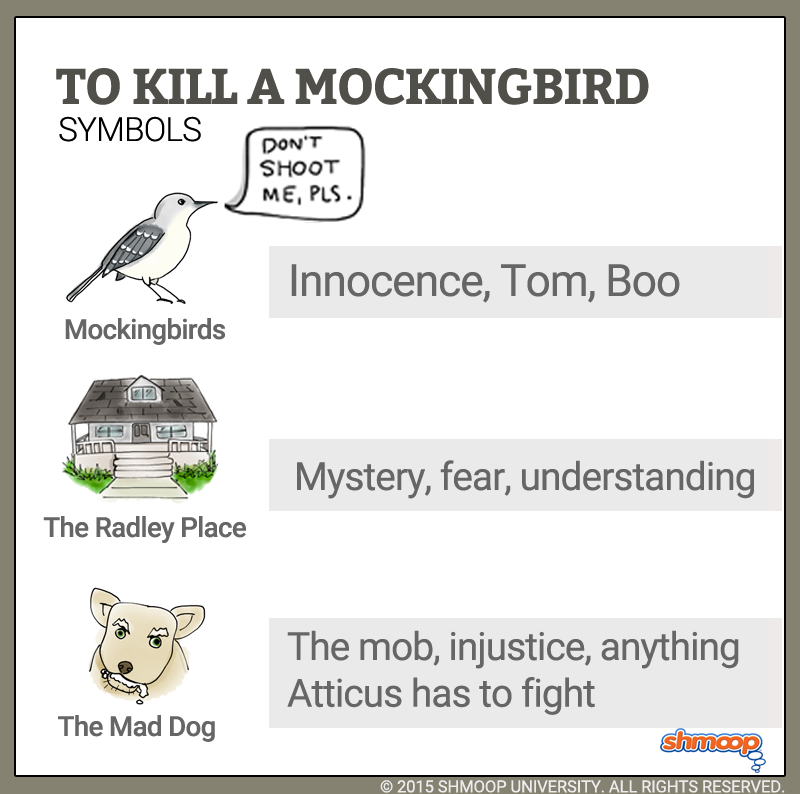Symbolism, Imagery, Allegory
 (Click the symbolism infographic to download.)
(Click the symbolism infographic to download.)
Meet Tim Johnson. He was just snuffling along, investigating interesting smells, burying bones only to dig them up again, and looking out for lady dogs, when—bam—the symbolic structure of the book picks him up and decrees he has to die. Why? What did poor Tim the Dog ever do to get infected with rabies and be gunned down like, well, a dog?
For starters, there's his name. It may seem odd to give an animal the last name of the family it belongs to, but it's apparently common practice in Maycomb. Judge Taylor's pooch gets the same treatment. But more interestingly, it allows the dog's name to sound suspiciously like that of another character. Tim Johnson…Tom Robinson? Coincidence? Maybe. But Scout's memory of her father shooting the dog does pop up more than once in situations involving Tom, and doesn't get mentioned otherwise.
For example, after Scout turns away the lynch mob, her memory of Atticus in front of the jail merges with her memory of him shooting the dog.
I was very tired, and was drifting into sleep when the memory of Atticus calmly folding his newspaper and pushing back his hat became Atticus standing in the middle of an empty waiting street, pushing up his glasses. The full meaning of the night's events hit me and I began crying. (16.3)
But why does Scout associate the two images? Perhaps they're both examples of Atticus doing tough things he doesn't want to do. Or of Atticus facing off with a mindless threat. (He does later refer to the men in the lynch mob as "animals" [16.22]).
Scout returns to this memory again when she's dozing off, waiting for the jury to announce its verdict in Tom's case:
The feeling grew until the atmosphere in the courtroom was exactly the same as a cold February morning, when the mockingbirds were still, and the carpenters had stopped hammering on Miss Maudie's new house, and every wood door in the neighborhood was shut as tight as the doors of the Radley Place. A deserted, waiting, empty street, and the courtroom was packed with people. A steaming summer night was no different from a winter morning. […]. I expected Mr. Tate to say any minute, "Take him, Mr. Finch...." (21.46)
Why does Scout have this feeling? In both past and present, she's waiting for something to happen; both times, she has no power over the outcome. In the previous instance, Atticus's skill with a gun was able to save the neighborhood from the mad dog; will he be able to do the same this time? The same image recurs once more as the jury delivers their verdict.
I saw something only a lawyer's child could be expected to see, could be expected to watch for, and it was like watching Atticus walk into the street, raise a rifle to his shoulder and pull the trigger, but watching all the time knowing that the gun was empty. A jury never looks at a defendant it has convicted, and when this jury came in, not one of them looked at Tom Robinson. (21.48)
Even Atticus's talent for sharp-shooting can't do anything if the gun isn't loaded. It's tempting to try to map out the symbolism here—is the gun the legal process? are the bullets the jury? is Tim Johnson racism?—but that might be an oversimplification. Perhaps it's just the feeling Scout has that's the link between the two situations—the sick horror at what's happening, but knowing that it can't be any other way.
